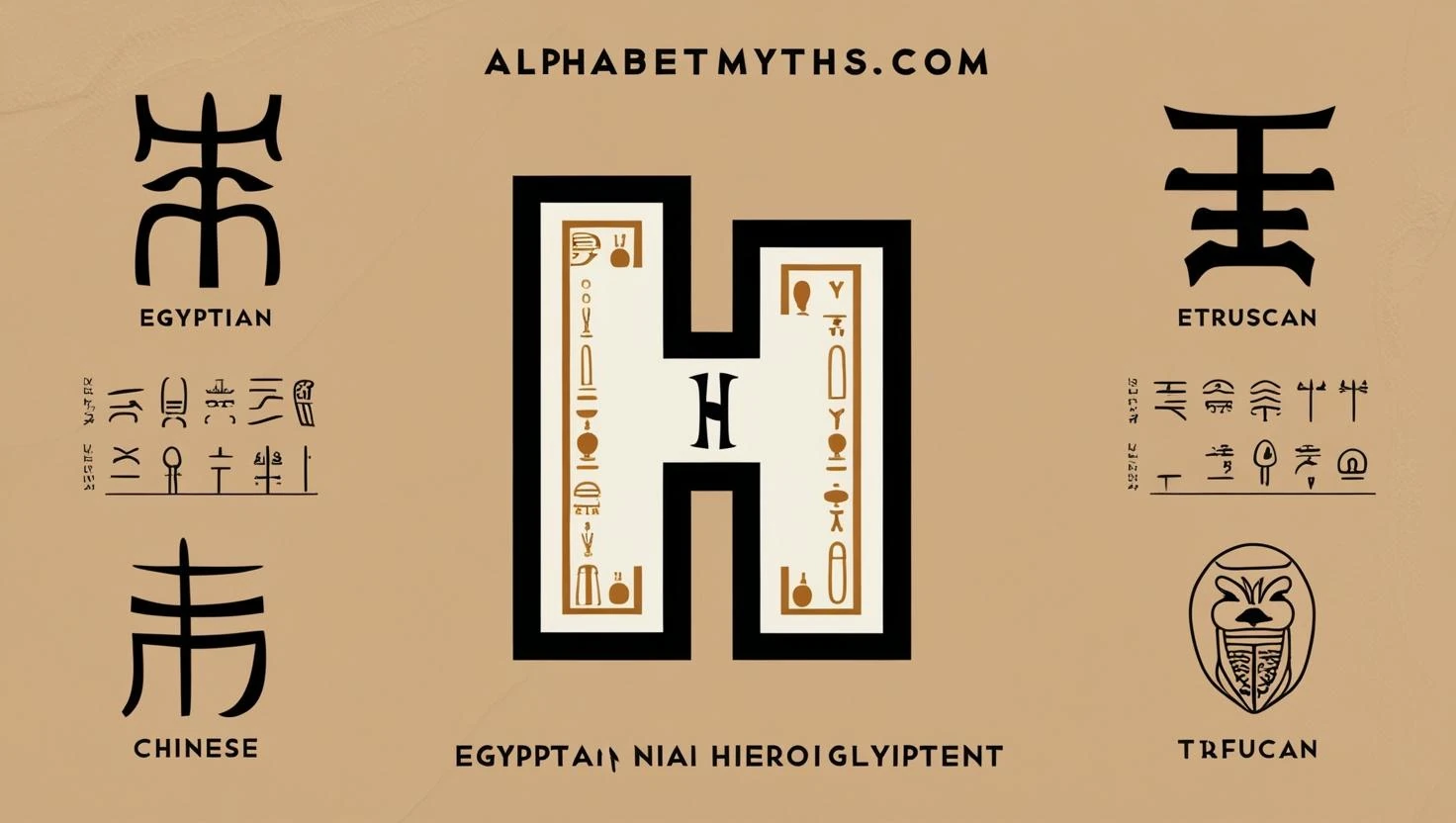Have you ever really thought about the letter H? You know, it’s funny how we just chat away every day without giving a second thought to the little letters that build all our words. I’ve always had a soft spot for the letter h – there’s something weirdly fascinating about it. This quiet little character is actually hiding quite the backstory!
It’s like that shy person at a party who barely speaks above a whisper, but somehow changes the entire vibe of the room. The letter H rarely draws attention, yet it transforms pronunciation and meaning in subtle but powerful ways.
Introduction to Letter H’s paradoxical nature — silent in sound, loud in influence
I’ve never really thought about it before, but the letter h is kinda weird that way. Sometimes you can barely catch it when someone’s talking – it’s just this tiny breath, like a half-second hesitation before you hit the vowel sound. My friend from London always teases me about how Americans “overdo” our letter h sounds! But here’s the crazy part – take that barely-there sound away from words like “hat”, “help,” or “home,” and suddenly you’ve got completely different words! “At” instead of “hat”? “Elp” instead of “help”? That tiny puff of air actually makes a massive difference.
I learned this the hard way when I was traveling abroad and my accent sometimes made people miss my letter h sounds. Asked for “help” at a train station once and the person thought I was saying “elf” – talk about a confusing conversation!
I was just talking about this with my cousin last weekend! It’s totally wild how this barely-there letter gets people so worked up about how to say its name. My grandma would practically have a fit if she heard anyone say “haitch” – for her, it was “aitch” or nothing. Meanwhile, my friend who went to a Catholic school in Ireland was taught “haitch” and gets equally annoyed by “aitch” folks. Such drama over a whisper of a sound!
The letter h is definitely not the show-off of the alphabet. X and Z are like those flashy characters who only need to make rare appearances to get all the attention. But h? It’s that quiet coworker who somehow ends up in every important project without making a big deal about it. I know this guy at work, Dave, who barely says a word in meetings, but when he finally speaks up, the whole room goes silent because everyone knows it’s gonna be something worth hearing. That’s totally the letter h – doesn’t need to shout to make an impact.
The Humble Origins of Letter H Through Ancient Alphabets
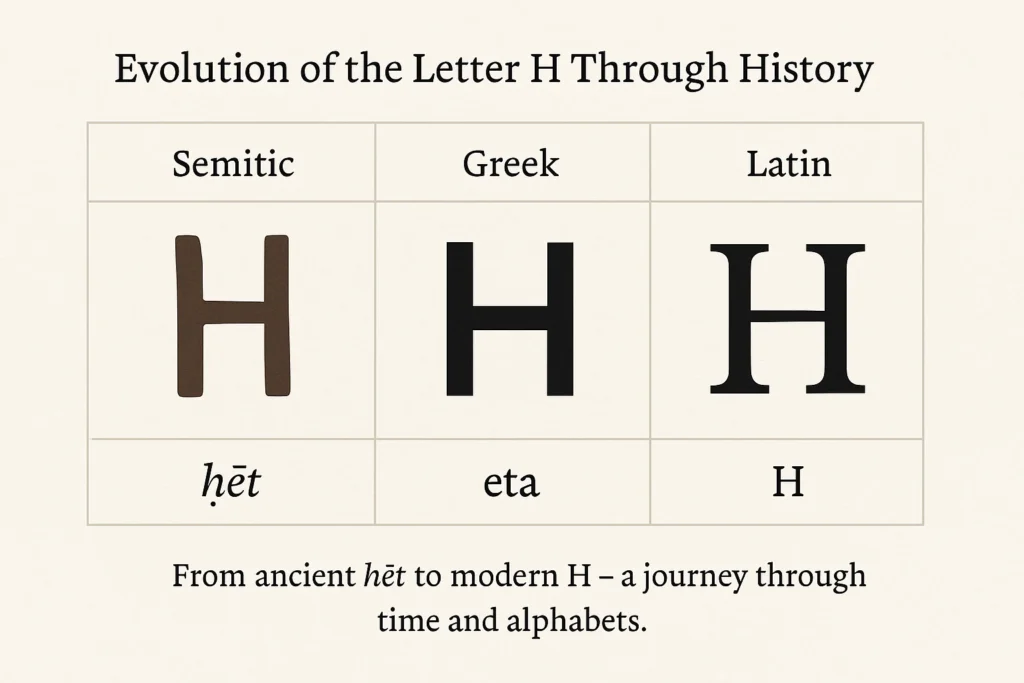
(AI Generated)
So I was reading this random linguistics book last summer (yeah, I’m that kind of nerd!), and it blew my mind learning about where our letter h actually came from. It started as this Semitic letter called ḥēt that had this super harsh throat-clearing sound – like when you’re trying to get something stuck in your throat but WAY more intense. Most of us English speakers would totally butcher it if we tried to say it right!
Then the Greeks got their hands on the Phoenician alphabet and were like, “Let’s take this and make it our own,” and turned it into their letter “eta.” At first, they used it for the letter h sound we know today, but get this – they later completely changed it to be a vowel instead! Talk about an identity crisis, right? My Spanish teacher would always remind us how languages evolve in these weird, unpredictable ways. It’s like how my nickname went from “Christopher” to “Kit” somehow – makes no sense, but here we are!
Do you know what gets me every time? It’s how this little letter h has somehow stuck around for literally THOUSANDS of years while languages completely transformed around it. It’s like that one family recipe that survives through generations even though nobody can quite remember who started it.
Think about it – through all those crazy changes in how humans talked and wrote stuff down, the letter h just kept adapting and finding its place. It’s basically the ultimate survivor! Started as this intense throat-clearing sound that would probably make us cough if we tried it today, and now it’s this gentle breath in words like “house” and “happy.”
My linguistics professor once compared language evolution to those family photos where you can see features passed down through generations – sometimes obvious, sometimes barely there. The letter h is like that distant cousin who somehow still has great-great-grandma’s eyes. Every time I see an ancient text with some version of letter h in it, I can’t help thinking, “You resilient little thing, you’ve seen it all, haven’t you?” It’s weirdly inspiring how something so simple can be so stubbornly persistent!
The Letter That Nearly Disappeared from English
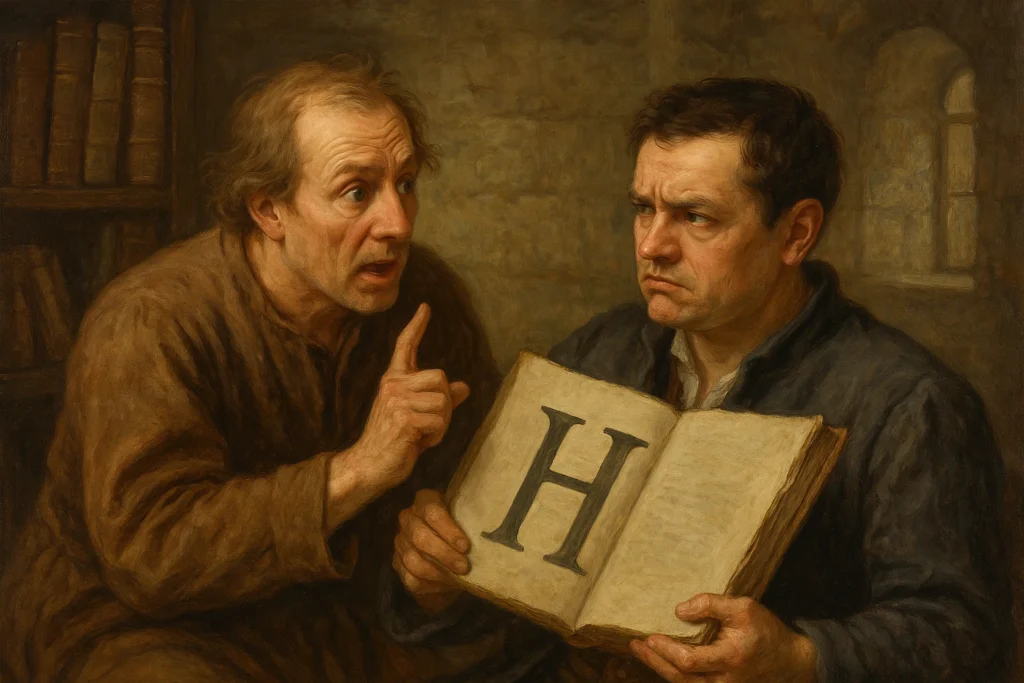
(AI Generated)
Man, I had no idea the letter h almost disappeared completely! It’s like one of those weird historical near-misses you never hear about. I was telling my brother about this the other day, and he didn’t believe me at first.
So there were actually these academic types back in the day who looked at the letter h and basically said, “Nah, we don’t need this one, chuck it out!” Can you imagine? If you look at those super old medieval books and scrolls, the scribes were totally inconsistent – sometimes they’d throw in a letter h, sometimes they’d just skip it like it wasn’t worth the extra ink!
Then the Normans invaded in 1066 (only date from history class I actually remember, lol) and things got even worse for our poor letter h. These fancy French nobles came over thinking the letter h sound was basically like clearing your throat in public – totally gross and uncultured.
The Curious Case of Silent H
That’s actually why we have all these words today where the letter h is just hanging out silently like “hour,” “honor,” and “heir” – they’re basically French words that English adopted.
The craziest part to me is how the letter h became this major social status thing by the 1700s. Drop your h’s when talking? Everyone immediately knew you were working class. Pronounce them all properly? Ooh, look at Mr. Fancy Education over here! My grandma was actually super strict about this – she’d correct us kids constantly if we “dropped our aitches,” as she called it.
H in Dialects: A Social Status Marker
Speaking of which – the whole “aitch” versus “haitch” thing is such a perfect example of how one tiny sound can reveal so much about where you’re from and even where you went to school! It’s like a secret password that instantly tells people about your background. My Irish cousins say “haitch” and my London friends say “aitch” and neither side will budge an inch on which is correct!
The Great Letter H Debate: Is It ‘Aitch’ or ‘Haitch’?
Few pronunciation differences spark as much regional pride and prejudice as the debate between “aitch” and “haitch.” This tiny distinction reveals surprising things about our backgrounds and identities. In the UK, saying “haitch” has traditionally been associated with Irish Catholic education, while “aitch” was the standard British pronunciation.
In Australia, the divide runs along similar lines. Catholic schools taught “haitch” while public schools insisted on “aitch.” Even today, many Australians can tell which type of school you attended just by hearing your name in this one letter!
The “haitch” pronunciation has gained ground in recent decades. What was once considered incorrect is now recognized as a legitimate regional variation. Linguists point out that “haitch” actually makes more logical sense — after all, we don’t pronounce F as “ef” but as “eff.”
I still remember my grandmother correcting my “haitch” to “aitch” when I was learning to spell. These tiny differences in how we say the letter h carry surprising emotional weight for many people.
Why H Is the Most Overlooked Consonant in the Alphabet
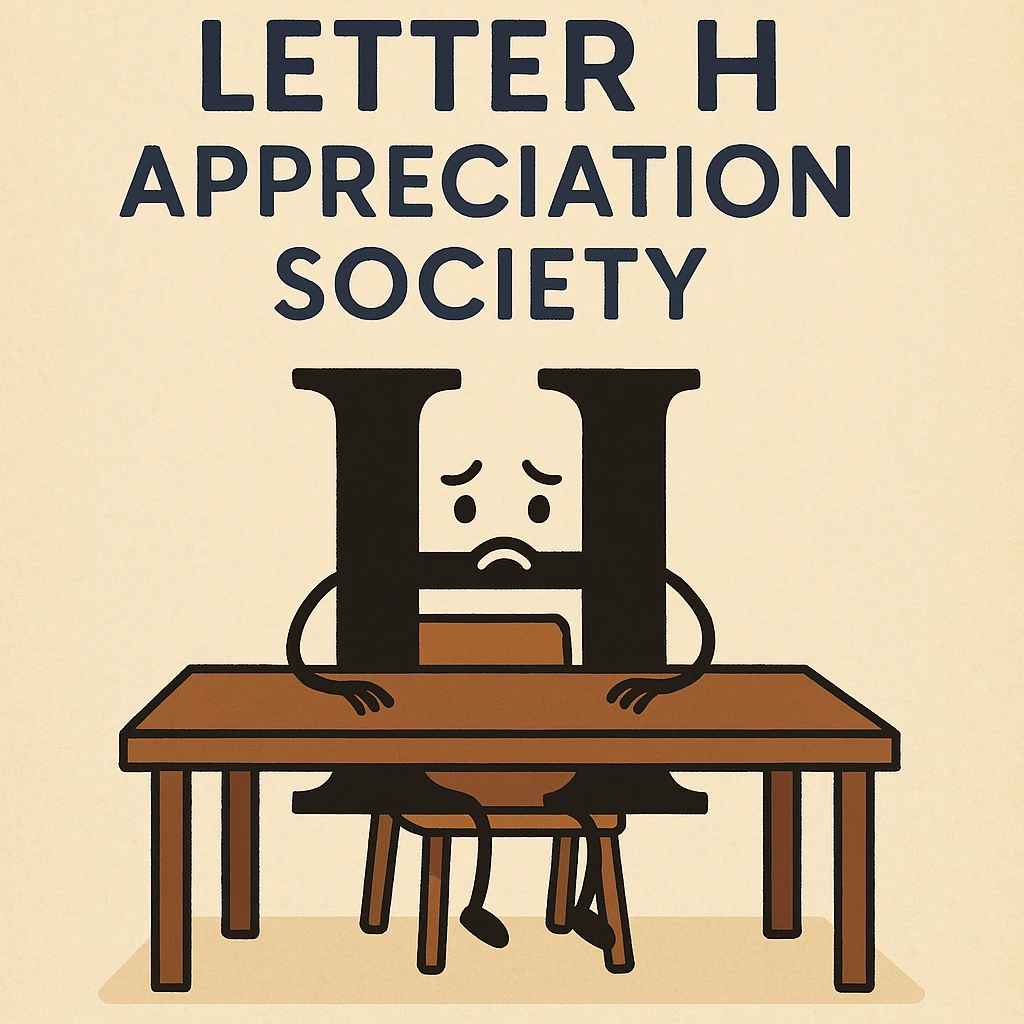
(AI Generated)
I was just thinking about this yesterday when I was helping my niece with her alphabet homework! Poor letter h is seriously underappreciated, right? Everyone’s always making a big deal about Z (ooh, so exotic and zebra-y) or how S can slither around making all those different sounds. Even K gets all this attention for its quirky kickstand shape.
Meanwhile, letter h is just sitting there doing TONS of important work with zero recognition. It’s basically two boring sticks with a line between them – not exactly winning any beauty contests in the front world. My design friend calls it “the most utilitarian letter,” which is designer-speak for “boring but necessary.”
But honestly, that’s what makes letter h kind of special to me. It’s like that essential coworker who handles all the boring-but-critical tasks that keep everything running, while the flashy letters get all the credit. My dad was that guy at his company for 30 years – not the one giving presentations in fancy suits, but the one who actually made sure everything worked!
I actually drew a little cartoon of the “Letter H Appreciation Society” once – it was just the letter sitting alone at a meeting table looking sad. Maybe letter h doesn’t need jazz hands and sparkles to be important, but it definitely deserves a high-five for all its behind-the-scenes work!
The Role of H in English Phonetics and Digraphs
Y’know, it really hit me when I was trying to help my Brazilian friend with her English pronunciation last summer. That’s when I truly got how the letter h is basically the ultimate team player in our language! On its own, it’s just this little breath sound, but pair it up with other letters? Magic happens!
Think about it – “sh,” “ch,” “th,” and “ph” completely transform into these whole new sounds that have nothing to do with either letter on its own. It’s like h is this linguistic catalyst that brings out wild new personalities in other letters.
The “th” sound is such a nightmare for my non-English speaking friends. My Italian colleague Marco still can’t say “three” without it coming out as “tree” after living here for 6 years! He literally puts his tongue between his teeth and still can’t get it right – and that’s entirely because of our sneaky letter h doing its thing.
And don’t get me started on “sh” – without that h, we’d be saying “soe” instead of “shoe” and sounding ridiculous. My 3-year-old nephew is in that stage where every “sh” becomes just “s” and it’s both adorable and a reminder of how crucial that letter h really is!
That “ph” combo is my personal favorite, though. I remember being SUPER confused in elementary school when I learned it makes an “f” sound. Like, why not just use “f” then?? My 5th grade teacher, Mrs. Collin, explained it preserves the Greek origins of words, and even at 10 years old, I thought, “That’s unnecessarily complicated!” Still do, honestly, but I’ve grown to appreciate how letter h shapeshifts depending on who it’s hanging out with. It’s like that friend who somehow fits in with every different social group!
H’s Soundless Magic: The Art of Being (Almost) Silent
I was at this coffee shop last week trying to explain to my friend why English spelling is so weird, and I grabbed a napkin and wrote “honest,” “hour,” and “heir” on it. I was like, “See these h’s? Completely useless in pronunciation, but you HAVE to write them!” She just stared at me like I’d lost my mind. But seriously, isn’t it kind of magical? These silent h’s are like ghosts haunting the beginnings of words – you can’t hear them, but they’re definitely there on paper!
What really blows my mind is how adding that tiny breath of a letter h sound can completely flip a word’s meaning. I once had an embarrassing mix-up when I was talking too fast and someone thought I said “art museum” when I meant “heart museum” (you know, like a male deer collection). The whole conversation went sideways until we figured out what happened!
Same thing with “eat” versus “heat” – one tiny puff of air changes the entire meaning from “let’s eat dinner” to “please heat dinner.” My grandma’s hearing aid sometimes misses these subtle letter h sounds, which leads to some pretty funny misunderstandings during family meals. Last Thanksgiving, she thought my brother asked her to “eat up the kitchen” instead of “heat up the kitchen,” and her confused face was priceless!
And don’t even get me started on “it” versus “hit” – that microscopic difference has caused so many texting mishaps in my group chats. Auto-correct seems to flip between them randomly, and suddenly a message about “hitting the gym later” becomes “it the gym later” and nobody knows what I’m talking about! It’s crazy how something so small can cause so much confusion!
Symbolism and Mysticism Around the Letter H
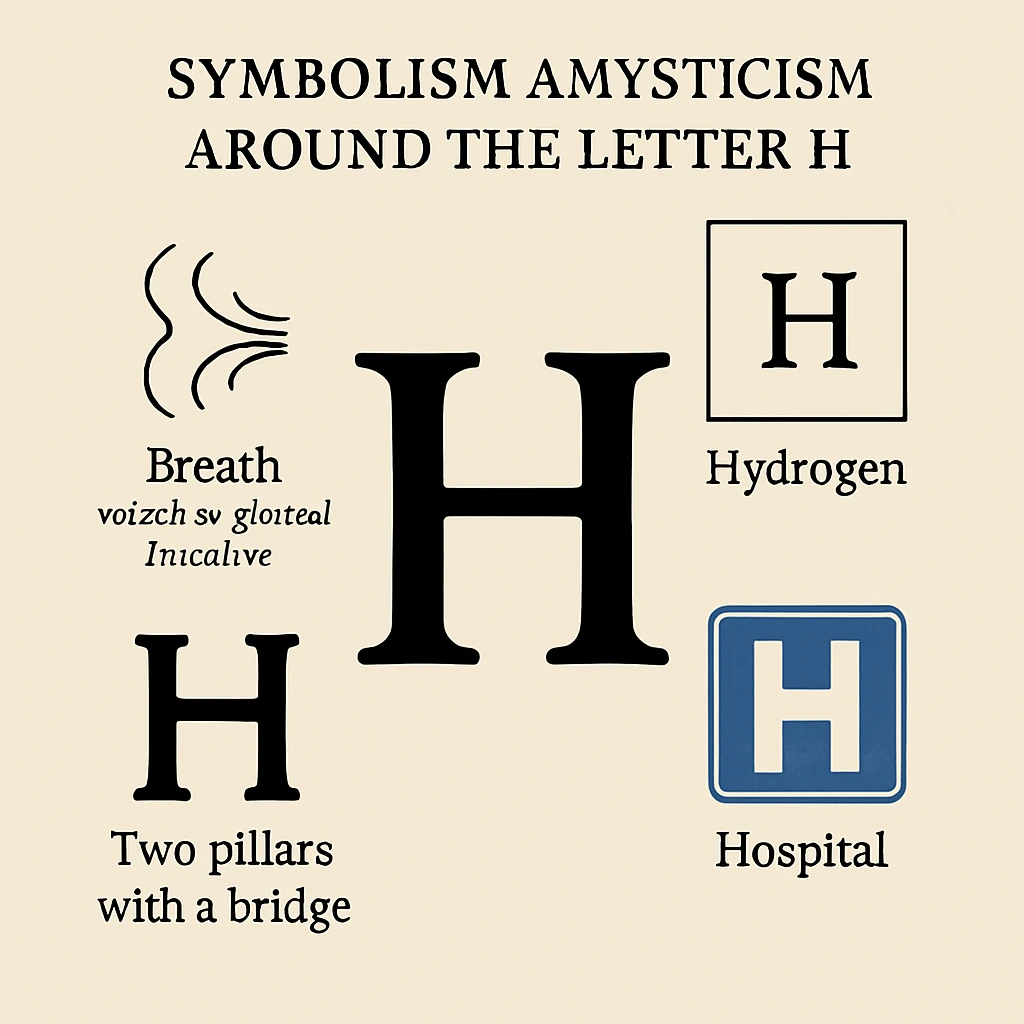
(AI Generated)
OK, so I was taking this linguistics course last semester, and the professor called the letter h a “voiceless glottal fricative” with the most serious face ever. I nearly laughed out loud because it sounds so complicated for what’s basically just… breathing with attitude! It’s literally just pushing air through your throat without making your vocal cords vibrate.
Funny enough, it’s probably the most natural sound we make as humans – like, babies in practically every culture make this sound without being taught. My sister’s 1-year-old adds random letter h sounds to everything when she’s excited – “ba-ha-ba-ha!” instead of just “baba.” It’s like her little lungs just need to let that extra air out somewhere!
Have you ever noticed how the letter h gets super obvious when people are out of breath? My running buddy and I have this joke about how you can tell who’s more out of shape based on how much their h’s take over when we’re talking during our jogs. After that big hill by my house, I’m all “H-h-h-how much f-h-rather?” with these exaggerated letter h sounds everywhere.
It’s like the sound of exhaustion has its own letter! My drama teacher actually used to make us run in place and then practice lines to emphasize how physical state affects speech – the letter h sounds were always the first to go wild.
I remember when my high school chemistry teacher, Mr. Peterson, first wrote a big “H” on the whiteboard – I thought we were having an English lesson crossover or something! But nope, he was introducing us to hydrogen, and I thought it was pretty cool that such a simple letter represents the most abundant stuff in the entire universe. Like, everything started with letter H – both our alphabet AND the cosmos!
My cousin who’s into astrology is always going on about letter symbolism, and even she admits that h has this special universal significance that crosses into so many different fields. She showed me this old book where different mystical traditions see the shape of h – those two pillars with a bridge – as representing the connection between worlds or between body and spirit.
I was like, “Are you seriously telling me people see deep meaning in what’s basically just two sticks with a line?” But when you look at hospital signs worldwide and see that big H, you realize symbols really do transcend language.
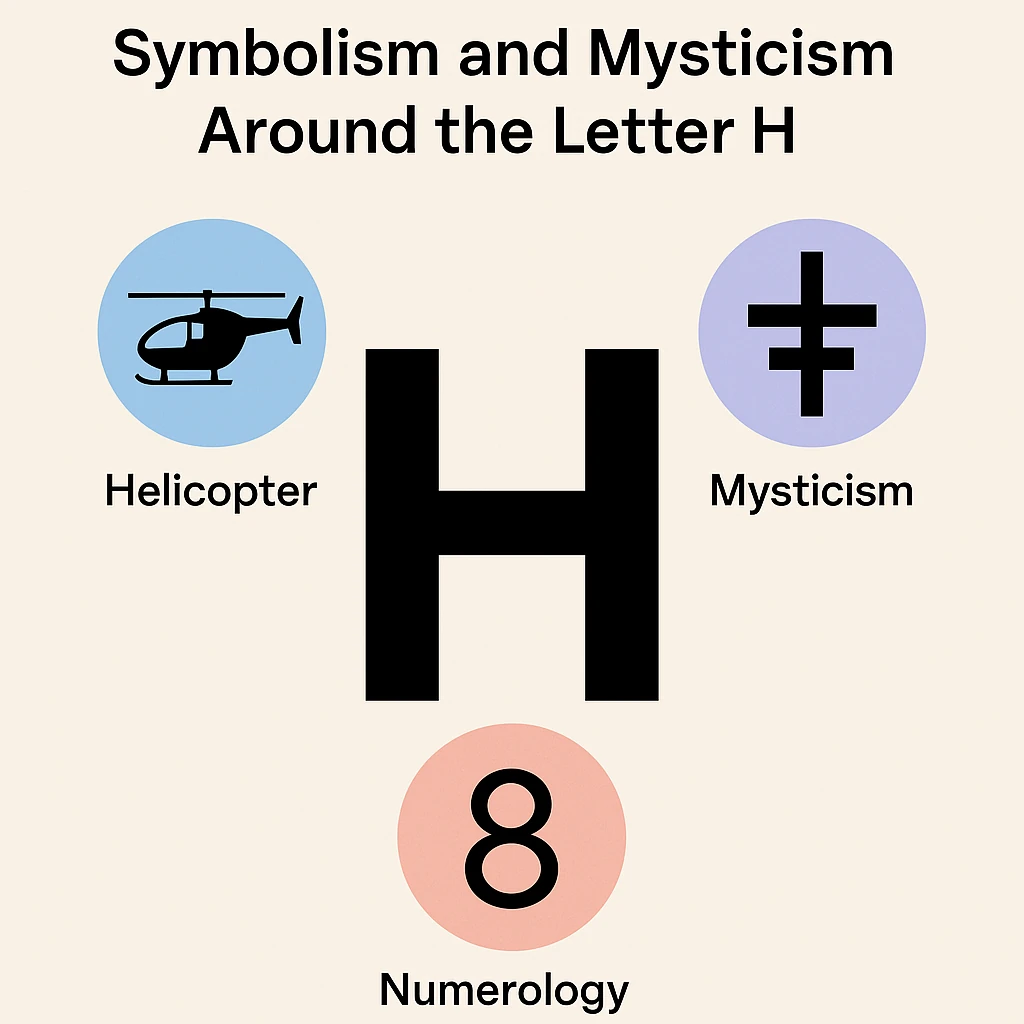
(AI Generated)
My favorite random h-fact that I use at parties (yes, I’m that person) is how it’s both a letter AND an element. Try naming another letter that pulls double-duty like that! The looks I get when I bring this up at social gatherings are priceless – a mix of “That’s actually kind of interesting” and “Please stop talking about letters at a birthday party.” But seriously, from hydrogen to hospital signs to ancient mystical meanings, our humble little h gets around in ways most letters could only dream of!
You know, I never paid much attention to this stuff until my aunt got super into numerology and mystical symbolism during her midlife awakening phase. She cornered me at Thanksgiving dinner last year with this whole lecture about how the letter h has all this spiritual significance. I was trying to reach the mashed potatoes but ended up getting a 20-minute explanation instead!
But I gotta admit, some of it was actually pretty interesting. She went on about how these ancient traditions saw him as representing the actual breath of life, which makes sense when you think about how it sounds like a gentle exhale. And then she got all excited, pointing out how the shape is basically two pillars with a bridge connecting them. “See, Justin? It’s heaven and earth connected! Body and spirit joined together!” She was drawing it in the air with her fork while my uncle rolled his eyes behind her.
The numerology bit is what my friend Sophia is obsessed with. She’s convinced that since h is the 8th letter, it’s connected to the infinity symbol when you turn 8 sideways. She literally checks for h’s in potential boyfriends’ names because she thinks it indicates balance and healing energy! The last guy she dated was named “Thomas” and she was over the moon about that middle h – didn’t work out though, so maybe she needs a new system!
What actually does make sense to me is how the universal hospital symbol became that big H. I never thought about it until I was driving my grandma to her appointment; she couldn’t read English but immediately recognized the hospital sign from a distance. It’s wild how one letter crossed over from just being a sound to becoming this worldwide symbol for “you can get help here.” My design professor would probably call that the most successful letter branding of all time!
The Letter H Effect on Branding and Pop Culture
You know what’s funny? I never realized how many major brands are basically just riding on the letter h until my marketing class last semester. Our professor had us list brand names starting with each letter, and h was like this goldmine of recognizable logos! H&M, HBO, Honda, Heineken, Hyundai, Hilton… the list just kept growing. My project partner, Kayla, worked for a design firm one summer, and she said the letter h is a dream for logo designers because it’s so perfectly balanced and symmetrical. Makes sense why so many companies gravitate toward it!
Speaking of letter h in different contexts – my older brother went through this punk phase in high school where he’d use all this slang I didn’t understand. One day I overheard him talking about “H” with his friends, and I innocently asked if they were discussing the alphabet. The awkward silence that followed was PAINFUL. Only years later did I learn that “H” was their code word for drugs. Talk about an embarrassing memory that still makes me cringe at family gatherings!
The internet does the weirdest things with letters, I swear. My gaming buddies went through this phase where they’d add random h’s to words for no reason. Like, instead of saying “what,” they’d type “whath” in the chat. Or “helloh” instead of “hello.” It made absolutely no sense but somehow became our inside joke for months. My non-gamer friends thought we’d lost our minds when our texts started including these random h’s.
And then there are all those serious expressions that use h-like “H-bomb” or “H-hour.” My grandpa was in the military and still uses terms like that. He’ll causally drop “We’ll meet at H-hour minus 30” when he’s just talking about arriving 30 minutes before a family dinner! Such dramatic terminology for eating pot roast at 5 pm on a Sunday, but that’s Grandpa for you!
Oh man, Hummer is such a perfect example! I never thought about it until my buddy Mike pointed it out during our road trip last summer. We saw this massive H2 rumbling down the highway, and he was like, “Notice how that hard H sound at the beginning instantly makes you think of something heavy and powerful?”
After that, I couldn’t unhear it! That strong exhale at the start of “Hummer” really does set up this whole macho vibe before you even finish saying the word. My uncle Bob (total car guy) swears the marketing team deliberately chose that name knowing the initial H sound would hit hard and match the vehicle’s bulky image.
It’s kinda like how action movie characters often have names with strong consonants – particularly H names like Hammer, Hunter, or Hawk. My film studies professor would go on about how the sounds of names aren’t accidental, especially in branding. That initial H in Hummer gives this gut-punch start to the word that perfectly matches those ridiculous oversized vehicles.
What’s funny is how other brands use the same letter for completely different vibes – like how Hyatt hotels use H to sound sophisticated and hospitable rather than tough. Same letter, totally different brand personality! I actually wrote a paper about this for my communications class last semester. Got an A-, which I was pretty stoked about!
When H Leads the Charge: Words That Start with Strength
Do you know what hit me the other day when I was journaling? Just how many really powerful, emotional words start with the letter h! I made this little list and was kinda blown away – hero, hope, heart, home, health, happiness, harmony, honor… these aren’t just random words, they’re like the foundation of what most of us value most in life.
My therapist actually pointed this out when I was going through that rough patch last year. She had me focus on “hope” as my anchor word, and then mentioned how interesting it was that so many healing and positive words begin with h. Ever since then, I have noticed these h-words everywhere.
My mom’s refrigerator has this cheesy magnet that says “Home is where the Heart is” – two h-words right there that instantly create this warm feeling. And my sister, who’s way more poetic than me, wrote this beautiful toast at my cousin’s wedding, all about “honor, harmony, and happiness” being the foundation of marriage. Not gonna lie, I teared up a bit!
What’s weird is how these words just hit different, you know? Like, you say “hero” and everyone immediately feels something. Same with “home” – it’s not just a place, it’s this whole emotional concept that’s hard to even put into words. I tried explaining this to my roommate, who studies linguistics, and he thinks there might actually be something to the way that gentle h-sound primes us for emotional content. Not sure if that’s scientifically accurate, but it feels right!
Typographic Quirks and the Elegance of the Capital H
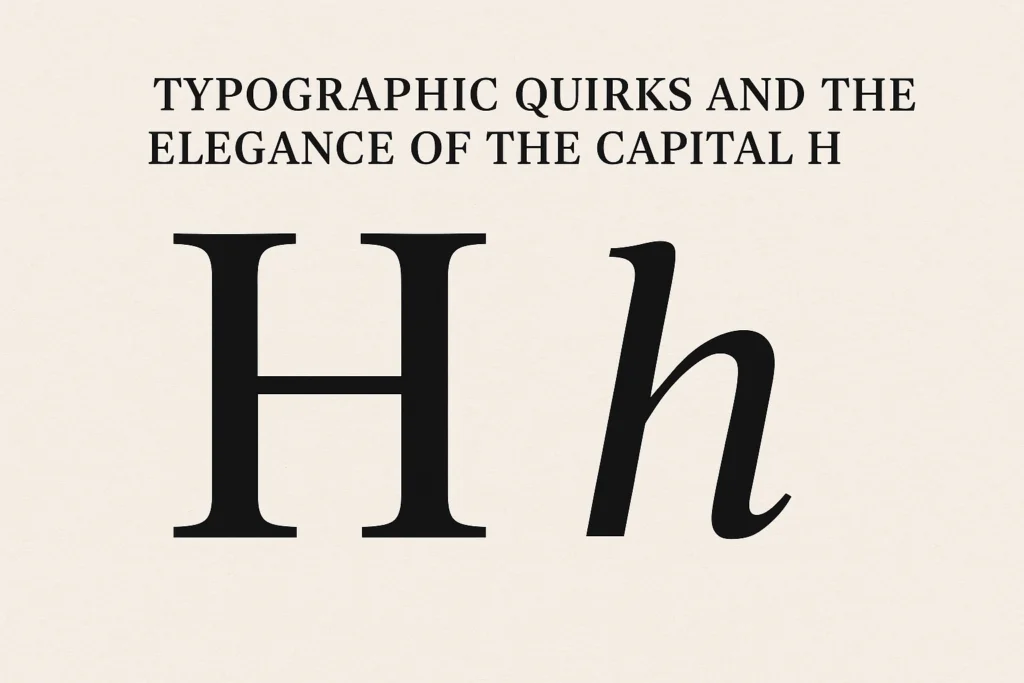
(AI Generated)
From a designer’s perspective, the capital H is a thing of beauty. Its perfectly symmetrical form — two vertical strokes connected by a horizontal crossbar — creates balance and stability. This symmetry makes H one of the most architecturally sound letters in our alphabet.
Typography experts often point to H as a key character when designing new fonts. Its proportions and the relationship between its strokes establish important parameters for the entire typeface. In some ways, H serves as a typographic anchor, helping to define the visual identity of a font.
The lowercase h has its own charm, with its ascender (the tall vertical stroke) rising above the x-height of other letters. This gives text rhythm and visual variety. The transition from the stem to the shoulder (the curved part) in lowercase h provides designers with opportunities to express the personality of a typeface.
I once took a calligraphy class where the instructor spent nearly an hour just on the letter H. Its seemingly simple form actually requires precise balance and proportion to look right. Drawing a beautiful H by hand teaches you patience and attention to detail.
How Kids Learn to Write H — And Why It’s Trickier Than It Looks
Elementary school teachers know that the letter h presents surprising challenges to young writers. Despite its apparent simplicity, many children struggle to form it correctly. They often invert it, confuse it with n, or misplace the crossbar.
Part of the difficulty lies in the letter’s combination of straight lines and the need to return to the top without lifting the pencil (for cursive h). The lowercase h requires changing direction and managing proportions — skills that are still developing in young children.
Interestingly, the difficulties children have with letter h mirror some of the letter’s historical transformations. Just as letter h evolved through multiple writing systems, kids often go through their own evolutionary process with this letter, trying various approaches before mastering the standard form.
I remember watching my niece learn to write her name, Hannah. The repeating h’s gave her fits until she developed a reliable motor pattern. Now she draws them with a flourish, having conquered what was once a frustrating challenge.
Silent but Significant: H in Non-English Languages
I had the most confusing experience during my semester abroad in Barcelona! For the first few weeks, I kept wondering why every Spanish word with an ‘h’ looked familiar on paper but sounded completely different when locals said it. “Hola” is just “ola,” “huevo” is “wevo” – it drove me crazy trying to connect written Spanish with spoken Spanish!
My host mom laughed at me one night when I was practicing vocabulary and pronouncing all the h’s. She explained that Spanish keeps these silent h’s purely for historical reasons – they’re literally just hanging out on the page as reminders of the word’s etymology. They’re like linguistic fossils! Made me feel better about my pronunciation struggles, but worse about having to memorize where they belong in spelling.
French is even trickier with their h situation! My high school French teacher, Madame Bertrand, used to get so frustrated with us for not understanding the difference between their “aspirated h” and “mute h.” I remember her dramatically waving her hands: “No, no, no! You must not make liaison with aspirated h!” None of us really got it until years later.
It’s this super subtle thing where some h-words get treated as if they start with a consonant and others as if they start with a vowel – but you never actually pronounce the h either way! Only the French would have silent letters with two different types of silence.
Then there’s German, which is basically the opposite end of the spectrum. My college roommate was from Munich, and he would practically cough up the h sound at the beginning of words like “Haus.” Germans give that letter the full respect it deserves – no silent treatment there! It’s funny how the same letter gets completely different treatment depending on which side of a border you’re standing on. Languages are weird, man.
The Curious Case of the ‘H Drop’ in Dialects
Omg, this h-dropping thing is such a perfect example of how one tiny sound becomes this huge social divider! I became completely obsessed with this after binge-watching all those British period dramas last winter. The way upper-class characters would visibly cringe when someone dropped their h’s was this whole silent class warfare happening through pronunciation!
My linguistics professor showed us this hilarious clip from My Fair Lady where Eliza Doolittle keeps saying “‘ow ‘orrible” instead of “how horrible,” and Professor Higgins acts like it’s the most painful thing his ears have ever experienced. But what blew my mind was learning that this wasn’t just movie exaggeration – people literally judged (and still judge!) your entire social background based on whether you pronounce your h’s!
My friend Jess studied abroad in London and came back talking about how she could instantly tell which parts of the city people were from just by listening for those dropped h’s. She said in East London, saying “house” with the h sound would actually make you stand out as not belonging there. The Cockney “‘ouse” and “‘eart” pronunciation has become this badge of authentic working-class identity that people are actually proud of now.
What’s really wild is how this happens in other English-speaking places too. My Australian cousin drops her h’s in certain words, and her husband (who went to some fancy private school) always gives her this look when she does it around his colleagues. You can literally see centuries of class tension playing out over a single missing consonant! Language is never just about communication – it’s this whole identity thing wrapped up in how we say even the simplest words.
Fun Facts You Didn’t Know About H
The letter h holds some surprising secrets and historical oddities. Did you know it was one of the last letters added to our Latin alphabet? While most letters have ancient Phoenician origins, h underwent significant transformations before reaching its current form.
H is also the only letter whose name in English is spelled with two letters (“aitch”) rather than including the letter itself. Even more curiously, H is both a letter and a chemical element — H for Hydrogen, the most abundant element in the universe.
Shakespeare was particularly fond of the letter h for its sound effects. In his works, characters often exhale dramatically with “ha!” or “ho!” to express everything from amusement to discovery. The Bard recognized h’s unique ability to convey breath becoming emotion.
Here’s a tongue-twister that highlights H’s unique properties: “In Hertford, Hereford, and Hampshire, hurricanes hardly ever happen.” This line from “My Fair Lady” was specifically designed to test proper h pronunciation — a challenge for Eliza Doolittle and many English learners.
H as a Bridge Between Air and Meaning
There’s something poetically appropriate about how the letter h transforms mere breath into meaningful sound. Of all the letters, h is perhaps the closest to pure respiration — it’s what happens when exhaled air meets the slightest intention to communicate.
This quality makes letter h a perfect metaphor for the miracle of language itself. Just as h turns breath into significant sound, language turns abstract thought into shared meaning. The letter h embodies this transition, standing at the threshold between silence and speech.
Perhaps this is why letter h appears in so many words related to the fundamentals of human experience. Home, heart, hope, health, happiness — these h-words connect to our essential needs and deepest longings. The gentle aspiration that begins these words mirrors their importance to our inner lives.
I sometimes think of the letter h as the most human of all letters — representing the very breath that keeps us alive while simultaneously helping us shape that breath into words that connect us to others. In its quiet way, h embodies both our physical existence and our capacity for meaning-making.
Fascinating Words Starting with H
Have you ever wondered why words like harmony, horizon, and hexagon feel so powerful? The letter H holds a unique charm, often symbolizing balance, mystery, and transformation across languages and cultures.
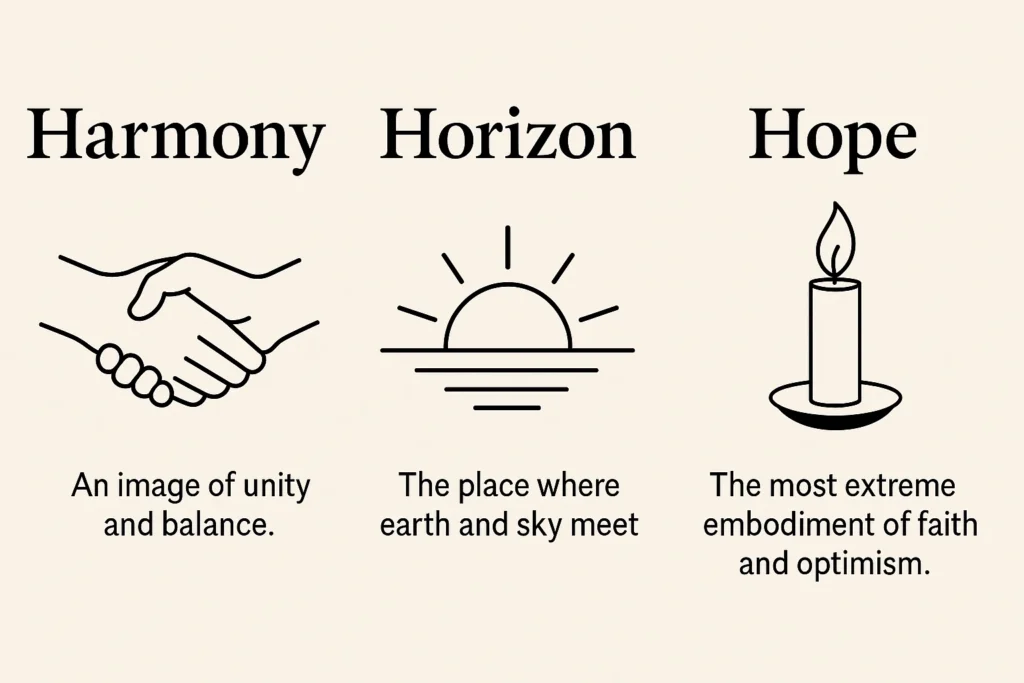
(AI Generated)
- Harmony: An image of unity and balance.
- Horizon: The place where earth and sky meet.
- Hope: The most extreme embodiment of faith and optimism.
Letter H in Science and Nature
The letter H plays a crucial role in science and nature, representing hydrogen, the most abundant element in the universe. It also appears in the Helix structure of DNA, the blueprint of life itself. From the Horizon that defines our view of the world to the H2O formula of water, letter H is a symbol of essential natural forces.
- Hydrogen: The most abundant element in the universe.
- Hawk: The majestic bird symbolizing vision and freedom.
H in Popular Culture
The letter H has a strong presence in popular culture, symbolizing everything from heroism to mystery. Iconic characters like Harry Potter and Hercules embody adventure and strength, while the infamous Hannibal Lecter represents the darker side of storytelling. In music, bands like The Who and songs like Hotel California keep H in the spotlight. The letter also plays a key role in branding, with giants like Honda, HBO, and Heineken using it for recognition. Whether in movies, music, or brands, H continues to shape cultural trends and capture the imagination.
- Heroism to mystery – This refers to the range of themes the letter H represents in pop culture, from heroic figures to mysterious characters.
- Harry Potter – The main character of Harry Potter, a famous book and film series by J.K. Rowling about a young wizard’s journey to defeat dark forces.
- Hercules – A legendary hero from Greek mythology known for his incredible strength and twelve labors, often depicted in movies and books.
- Hannibal Lecter – A fictional character from The Silence of the Lambs, a brilliant but terrifying cannibalistic psychiatrist.
- Honda – A well-known Japanese company that manufactures cars, motorcycles, and other vehicles.
- HBO – A major American television network famous for producing hit series like Game of Thrones and Westworld.
- Heineken – A globally recognized Dutch beer brand.
- Homer: The sage poet who was known for classic tales.
Words That Begin With Letter H
H whispers instead of shouts — hinting at power in silence. These words reflect its hush and heft:
- Hosting – Renting space online for your website to live and be accessed. Learn hosting basics
- Hustle – Consistent effort over time that builds results, especially in online work. What is hustle
- Habit – A repeated action that shapes identity and success. Habit science
Conclusion: More Than Just a Letter
I was thinking about this whole letter h journey while walking my dog yesterday morning – it’s kinda wild how this unassuming little letter has such a rich story to tell! If someone asked me to pick one letter that really captures what language is all about, I’d have to say h would definitely be in my top choices.
What gets me every time is this crazy contradiction – h is this super quiet, sometimes completely silent letter, yet it packs such a punch! It’s like my friend Taylor – she barely says a word at parties, but whenever she does chime in, everyone just stops and listens. Somehow, she changes the whole energy of the room without making a fuss about it.
That’s exactly how I see the letter h working! Makes me think about how my grandma always said you don’t need to be the loudest voice in the room to have the biggest impact. I’ve noticed this in meetings at work too – sometimes it’s the quiet suggestions that end up being the game-changers, not the ideas being shouted across the table. H is basically the introvert’s champion letter, proving that you don’t need jazz hands and spotlight moments to matter in a major way.
I love how resilient this little letter has been throughout history. People have literally tried to kick it out of languages, ignore it, or change it completely, yet here it is, still going strong thousands of years later! My history teacher would call that “adaptability at its finest.”
I caught myself paying extra attention to h-words during a phone call with my sister last week – “hope,” “happy,” “home” – and it hit me how these aren’t just random words; they’re concepts that matter deeply to us as humans. There’s something almost poetic about how this gentle breath sound introduces some of our most meaningful words.
So next time you’re writing something or saying “hello” to someone, maybe take a second to appreciate this humble little letter that’s been quietly shaping how we communicate for centuries. Without it, our conversations would sound completely different – and honestly, way less interesting! Who knew such a simple character could have such a fascinating backstory?
Continue Your Alphabet Journey
Explore More Letters:
A | B | C | D | E | F | G | H | I | J | K | L | M | N | O | P | Q | R | S | T | U | V | W | X | Y | Z
Share this article:
Did you enjoy learning about the letter H? Share your thoughts in the comments below or spread the knowledge by sharing this article with fellow language enthusiasts!
